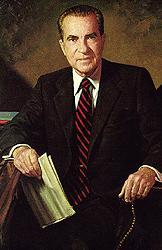Posted on May 10, 2001
The ABM Treaty Trick
'72 deal died when the USSR did
by
Daniel Clark
Of all manifestations of liberal media bias, perhaps the most conspicuous is polling. While those who write and broadcast the news are always trying to influence the way you think, polling is their way of stating flatly, "You think this."
From the media's own viewpoint, their system is foolproof. They devise a question that is virtually guaranteed to produce a certain response, and when it does, they cite that response as affirmation of their perception of what you think. It's easy to see how they can convince themselves, by the end of that process, that they have actually made up your mind for you. The temptation to use such an awesome power would be very difficult to resist, which might explain why it is so often that newspapers use their own polls as front page news stories.

A favorite method of manipulating poll results is to present the respondents with false choices. This was most effective in regard to President Clinton's approval ratings. In order to produce high job approval numbers, pollsters had to peel Clinton in two, so that they could juxtapose his "job" with his "personal life." This approach adopted the Clinton administration spin that all his scandalous behavior, most of which involved abuses of his presidential power, was defined as his "personal life." By contrast, his "job," was left to be defined simply as the absence of controversy. To nobody's surprise, it turned out that the public was very upset with Clinton over his personal life, but was generally satisfied with this job thing of his, whatever that was.
False choices are often employed by pollsters to put people in the position of sacrificing one conviction in favor of another. Frequently, one reads such polling questions as, "Would you rather provide school lunches for needy children, or receive a tax cut for yourself?" The two aren't mutually exclusive, but they're presented as if they were. Obviously, a question like this is intended to pressure people who favor a tax cut into saying that they don't, for fear of sounding selfish. Again, the purpose is not to measure public opinion, but to tell people what their opinions should be.
A January ABC News/Washington Post poll took this deceptive practice to a new low. It purported to show that the strategic missile defense plan outlined by George W. Bush would lose support dramatically, if the public were told that the plan violated the 1972 ABM Treaty. Approval of the plan dropped from 80 percent to 47 percent, once respondents were asked whether they'd still support it if it "broke an existing treaty with Russia."
One small problem: the United States does not have an anti-ballistic missile treaty with Russia. The ABM Treaty was an agreement between the U.S. and the Soviet Union, designed to prevent each party from developing a missile defense shield, in a warped effort to preserve peace through "mutually assured destruction" (also known by its descriptive acronym, MAD). The deal was voided by the demise of the USSR in 1991. Russia does not inherit the treaty, nor is the U.S. bound to abide by its restrictions unilaterally. The ABC/Post poll tells its respondents that America cannot implement a missile defense system without breaking its word. Since that's not true, the result of the poll is grossly inaccurate. Now that Bush has made a specific missile defense proposal, however, that 47 percent figure will be used against him ... which, of course, was the idea in the first place.

If the ABM Treaty were still in effect, the Bush proposal would, by necessity, more closely resemble the Strategic Defense Initiative (SDI) which President Reagan unveiled in 1983. Reagan would never have signed the ABM Treaty himself, but he'd been saddled with it by President Nixon, and therefore had to take it into consideration when crafting his defense plan. If you find it curious that the media now refer to Nixon as a great -- possibly our greatest -- foreign policy president, it's important to remember that he had "grown" out of the rigid anti-Communism of his Eisenhower administration days, and that his dealings with the Soviet Union were largely based on an assumption of American inferiority.
Both sides knew that if either country developed a reliable defense against nuclear missiles, it would gain nearly as decisive an upperhand as the U.S. held during the pre-Rosenberg atomic era. Nixon signed the treaty in order to defend the U.S., guided by a belief that the Soviets were more capable of developing anti-missile technology than we were. Reagan knew better.

Ronald Reagan understood that a totalitarian government, by its nature, inhibited the productivity and inventiveness of its people. Better yet, he understood that the Kremlin understood this. Reagan knew that, by proposing a strategic missile defense system, he would reopen the technology gap between the two superpowers, because the Soviets would believe we were capable, but realize that they weren't. Unfortunately, this vision of his was obstructed by Nixon's confounded ABM Treaty.
Reagan found a way to coexist with this arms pact by proposing his satellite-based Strategic Defense Initiative. The treaty placed prohibitions on the deployment of ABM systems, which it defined as consisting of interceptor missiles and their launching mechanisms. Since SDI was designed to detonate airborne missiles with laser beams, and not to knock them down with anti-missile missiles, it did not conflict with the ABM Treaty.
President Bush the Elder shelved the expensive SDI project when the Cold War ended, but recent developments in nuclear proliferation have convinced his son to revive it. The MAD principle created a precarious balance between two nations. To put it into practice among twelve would be completely untenable. There can therefore be no debate over whether we should develop a missile defense system before rogue nations, which already have nukes, develop the technology to deliver them.

Thankfully, the demise of the Soviet Union, and the subsequent expiration of the ABM Treaty, have allowed G.W. Bush to supplement the original SDI project with a more immediately feasible plan based on ground-based interceptor missiles, which Nixon's short-sightedness prohibited Reagan from exploring. It is due to Bush's recognition that the treaty is dead, and not to his having killed it, that he was able to include a missile-based option in his plan.
One might expect that anti-nuke activists would be thrilled by any proposal that could potentially render intercontinental nuclear missiles obsolete. They're not. Greenpeace warns on its Stop Star Wars website that "It would destabilize the current strategic 'balance of terror' between the U.S. and other nuclear states and undermine key arms control agreements such as the Anti-Ballistic Missile Treaty, described as a cornerstone of global stability."
According to the Cold War calculus of the political Left, which drew a moral equivalence between the two superpowers, the true threat was that any disparity in power might lift the deterrence of MAD from one side or the other. Indeed, it is not an uncommon opinion among left-wing academics that no one nation should ever have had a monopoly on atomic weapons, therefore the Rosenbergs' treason was actually a stabilizing factor.
The baselessness of such relativism cannot be overstated. During the latter stages of the Second World War, every major power in the world was trying to develop atomic weapons. The fact that the country which succeeded was the United States should be taken by the rest of the world as definitive proof of the existence of God. One would expect, following the MAD doctrine, that a single country in possession of such overwhelming power would go on an imperialistic binge. Instead, the U.S. went to work helping both its allies and enemies rebuild themselves. It does no good, though, to point this out to Cold War relativists, because their belief in American immorality is a matter of faith.
These critics of W's missile defense plan are having trouble making their arguments stick, and for good reason. After all, who wants to continue living in a "balance of terror?" Trying to convince the American people that they are made safer by being left vulnerable is the height of absurdity.
Since Bush's opponents can't win by criticizing the possible success of his defense program, they instead deny that it might succeed. Senate Minority Leader Tom Daschle (D, S.D.) has announced his opposition by saying that the president is selling America "a lemon," and pronouncing the abandoned SDI program a "failure," because the first couple tests were unsuccessful. (If only Daschle held Social Security, wealth redistribution and federalized public education up to that same standard of "failure" ... but that's another column.)
This is the same tactic that was used when Reagan first proposed SDI, when Senate Democrats, and their muppets in the news media, ridiculed it as "star wars." It could never work, they insisted. The necessary technology was too far from our grasp. On the surface, this may sound like sober reasoning, considering that we're talking about an invention that doesn't yet exist. But if you are old enough to remember being awed by video pong games, and you are now reading this column on the internet, you just might disagree.

Think about what occurred technologically during World War II. The war lasted only six years, yet it began with bi-wing airplanes, and ended with jet engines, radar, and the atomic bomb. By comparison, the development of a missile defense shield in the twenty-first century is not so outlandish.
Since Americans understand why they should want to implement a missile defense system, and have reason to believe it can be done, the idea that it is somehow prohibited becomes the last line of attack for by the plan's critics. This is an especially promising tactic to the news media, because it relies on the public's reliance on them for information. The desirability of protection from missile attacks is easy for anyone to see, but how many people are going to understand that we are no longer bound by the ABM Treaty, if the press does not faithfully report it?
This is what makes the ABC/Post poll especially noxious. It asks its respondents to consider a premise that whoever crafted the question must have known is false, while knowing at the same time that the media outlets that commissioned the poll would be taken to be authorities on the issue. If confronted over the question's legitimacy, however, the pollsters could simply point out that they didn't say that Bush's plan would break "an existing treaty with Russia"; they merely asked what if.
The inference is clear to journalists who report the poll results, though. A May 2nd USA Today column by Walter Shapiro, which cited the poll, appeared under the headline: "'New foundation' shoots down 1972 missile treaty." While Shapiro gives missile defense advocates credit for having genuine and well-meaning convictions, he concludes that, "Bush is committed to the unusual stance that tearing up a treaty is a step toward lasting peace."
That's a lie, but it's not Shapiro's lie. He's probably just giving an honest interpretation of the polling question's dishonest premise. By doing so, he has unwittingly passed the lie on to his readers, many of whom will now believe it as well. After all, they read it right there in the paper.
Ronald Reagan often said that the problem with liberals is that they know so much that isn't true. As usual, his critics seem perversely determined to prove him right.
The Shinbone: The Frontier of the Free Press
Mailbag . Issue Index . Politimals